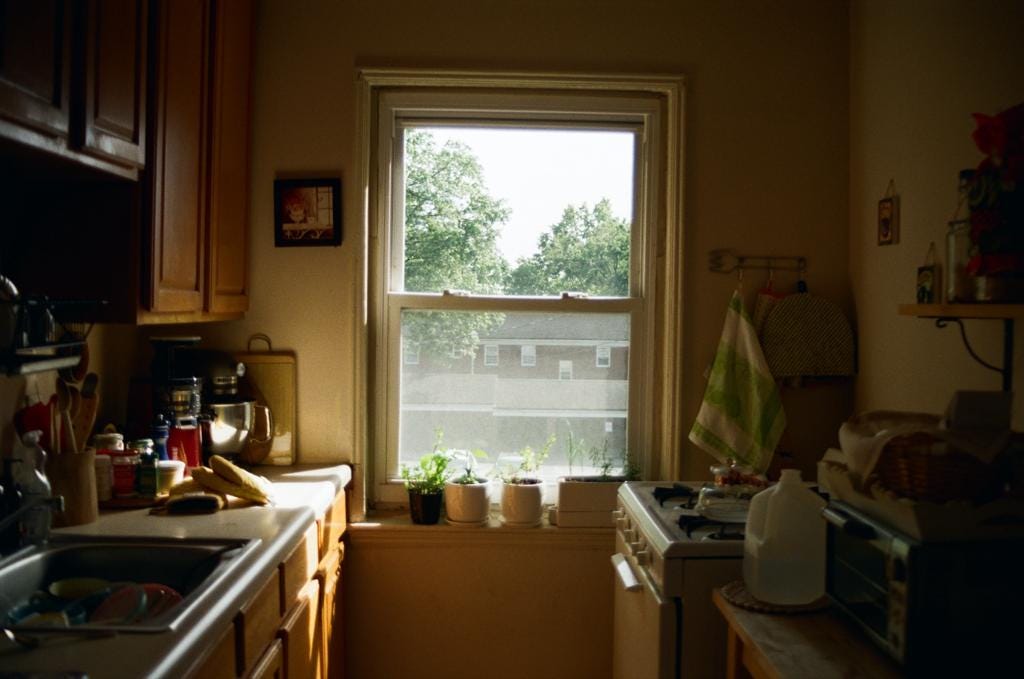Send it to Ukraine
Spring cleaning is a task for everyone, but when war threatens the immigrant network of hand-me-downs, who do I send my stuff to?
Purging and acquiring new items is cathartic. Humans accumulate a lot of stuff. Any series of garage sales, estate sales, Facebook Marketplace searches, will reveal that there is an intrinsic need to get rid of things. Donation banks, churches, the stoops of New York City, are spaces where material items are dropped off for a new life or a second glance. Passing family heirlooms is another tradition that lets go of treasured objects and places them into new hands.
For me and my family my things stayed clear from online platforms or organized sales events, and instead were always packed up in a box and shipped to Ukraine; the old fashioned way. The Jets jersey I stole from my high school boyfriend landed in the special box for Ukraine. Self acclaimed vintage pieces like 2016 Holister skinny jeans, and Abercrombie & Fitch tops went to Ukraine. Puffer jackets, sweatshirts, leggings, t-shirts, all went in the box to Ukraine along with fragments of the life of an American teenager.
Arriving in Ternopil, a city in western Ukraine, my clothes were then rummaged by a teenage girl. My teenage life existed in the monotony of American suburbia. I wore these pieces to basement parties, date-nights at the Cheesecake Factory, and family gatherings in small apartments. Once my clothing no longer fit in the closet that I shared with my twin sister, they would get recycled to a girl who I never met. Is this process of shipping m
y jeans to Ternopil a spinoff to the Secret Life of the Traveling Pants? And if so, how come I never received the secret bond of friendship in return? Our lives existed in parallels. We were the same age, we knew of each other’s existence, and for years I have shared parts of my self expression with her.
This teenager in Ukraine, who is now a young woman, is the granddaughter of my family’s housekeeper. Anya, is a vital force in my family’s existence in America. She was me and my sister’s first babysitter. Sitting in the back seat of her beat-up yet trusty Honda Accord, she would drive us to her clients homes. She cleaned the homes of other Russian immigrants. Some homes were decadently large, with big staircases and master bedrooms. Other homes were less glamourous, yet Anya did her work efficiently for each. Anya was not only just a housekeeper for Russian families. She went above her job description. She babysat her client’s children, cooked food for the babushka’s, and in return our family’s heads were above water with clean homes and borscht in the fridge. Since the war broke out between Russia and Ukraine, Anya’s granddaughter fled Ternopil, and my mother no longer keeps a box for Ukraine.
War threatens the social fabric of any community. It tethers the strands that keep people together. It complicates ideas of national identity. And when a community is fighting a civil war of ideologies, is there a right and wrong stance? For Ukrainians and Russians the community is riddled with these grudges and gossip. Those who believe in the Russian propaganda cycle create their own club for Russian nationalists. They see themselves as individuals who rebel against the United States media cycles. To them, the war is reduced to misinformation and fake news.
So, I take the unused toys that my family no longer needs. I bring a bag of cookies I baked during a rainy day. And I take these items to an apartment complex neighboring my own. I walk up the grey dusted stairs, past the paint chipping on the walls, and walk inside a warm and happy home. I see the twin bed I spent my childhood sleeping on in the foyer of the apartment. I see my storage dressers from high school stacked on top one another. And I give away old things to a Ukrainian family that I too have shared bits of my life with. Lora, the babushka, also babysat me and my sister, now nanny’s her grandson’s two-year old daughter. She has silver hair shaped in an 80’s updo and two front teeth missing. She smiles brightly and embraces me as I explain to her the toys. For this Ukrainian family, life in America is challenging. Lora’s husband works long days at a plant in Newark and sleeps in the living room. They have a small child drawing on walls, a teenage girl, and two resilient women at the forefront of the household. I have known this family my whole life. And despite the war, and political differences, my mother still provides them with discounted medicines from her pharmacy and frozen salmon caviar.


